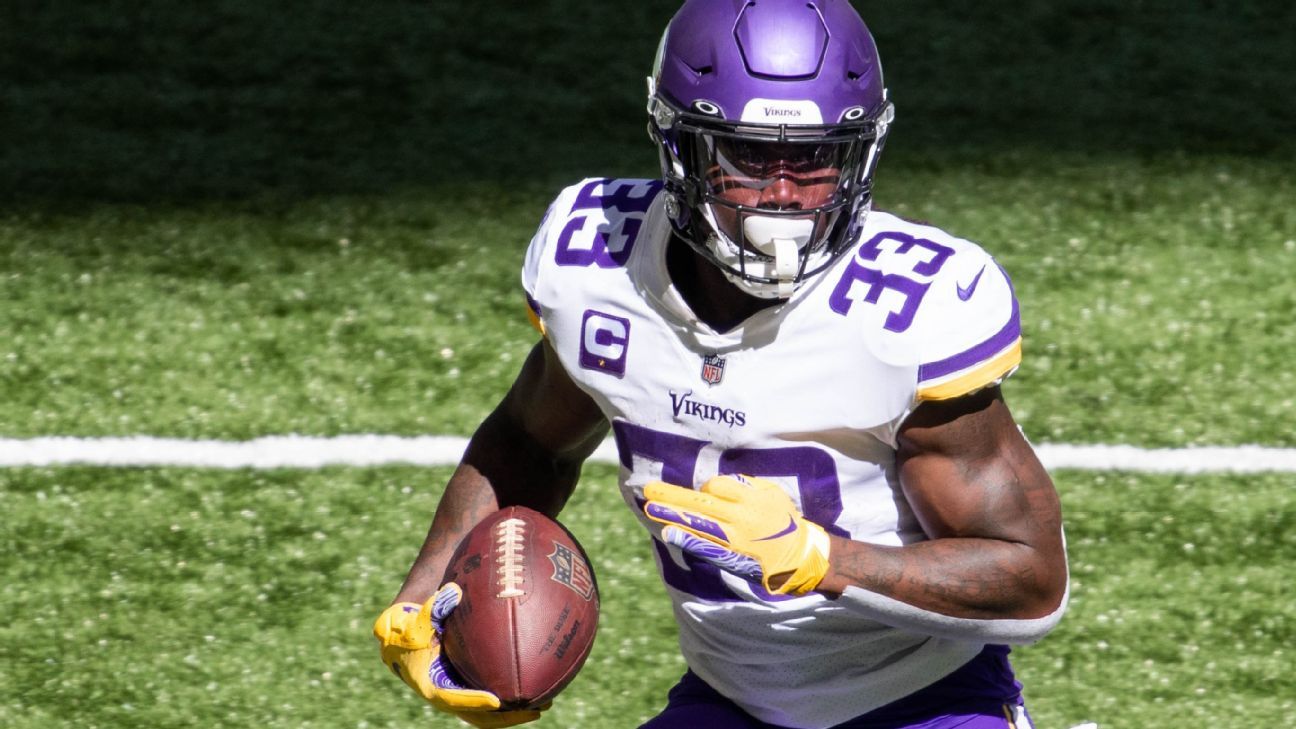EAGAN, Minn. — Three months stand between now and the Minnesota Vikings game-planning how to wear down defenses, but they are thinking ahead to when they will need to call on running back Dalvin Cook to pick up where he left off from his career-best season.
Cook, 25, rushed a career-high 312 times for 1,557 yards (5.0 yards per carry), was first in total yards (137) and touches (25.4) per game and second in touchdowns scored by a running back (17) and touches (356) in 2020.
History has shown running backs who handle such a heavy load in one season often decline the following year. It happened with the Carolina Panthers’ Christian McCaffrey last season after notching 403 touches in 2019. The same goes for former Houston Texans running back Arian Foster the season after his stellar 2012 campaign (391 touches). Backs from Terrell Davis to Eddie George to Jamal Lewis have experienced injuries or a loss of effectiveness after a heavy usage season.
Cook’s threshold isn’t as high as those who fall under the “Curse of 370” category, but the Vikings are being deliberate with their intent to preserve the star they signed to a five-year, $63 million extension in September 2020.
That means monitoring his workload — such as limiting reps in OTAs, minicamp and training camp — so they can run the offense through him for 17 grueling weeks.
“… he’s got an unbelievable [running backs] coach, Kennedy Polamalu, who’s always tracking those things,” Vikings offensive coordinator Klint Kubiak said. “Our strength staff (is) monitoring their workload in practice every day with the GPS tracker. So we’re aware of his touches, we’re going to manage them, but you also want to get him plenty of work because like all players, they need repetition to improve.”
Cook’s first three seasons were shortened due to an ACL tear as a rookie, a hamstring injury that limited him to 10 games in 2018, and wear and tear that kept him out of two games in 2019. Cook sat out Week 6 last season due to a groin injury but still managed to put up numbers that entered him into the MVP conversation at one point.
Part of Cook’s ability to stay on the field and be productive last season was due to changes he made to his routine, especially in the offseason. That includes knowing when to pull back and when to hold down the throttle.
“I’m feeling good,” Cook said. “I’ve been busting my tail all offseason trying to get ready. For me, it’s all about staying patient. I want to play football right now. That’s how my body feels.
“What I added to my game, it’s really nothing. It’s being a better teammate for me. Helping my younger guys get better. We have a young team, and me stepping up and being who Dalvin Cook is, and not stepping outside of the box and being nobody else, and being Dalvin Cook and helping guys get better — helping guys get comfortable. I think that’s going to be the best way this team goes where we want it to go.”
Part of that comes with Cook taking on an increased leadership role, so other backs like Alexander Mattison, Ameer Abdullah and rookie Kene Nwangwu can benefit from how he has learned to care for himself.
“That’s something I didn’t have as a younger guy was a routine to get my mind and body ready to go every week,” Cook said. “Or get ready to go for practice or anything. I didn’t have a routine. That’s what I try to tell the young guys. While you’re young, try to get a routine going so you can get yourself going. I think naturally once you get a routine going, your mind clicks, your body clicks, and everything gets going.
“So now I’m in year five, and I’ve got a routine for everything I do and how I want to do it. Like I said, the people I’ve got around me know how I want things done. And I think that’s important. Your body just naturally responds to it, and I think that’s the point I’m at right now.”
Cook has added more recovery to his regimen every year since being drafted in 2017. Training in the weight room is a key component of any athlete’s offseason program, but there are specific things running backs must do to prepare for a heavy workload.
“My first couple of years I got banged up and it was, ‘What can I do a little different to not get put in that situation again?’” Cook said. “Focusing on those little muscles, focusing on the things that you think that don’t matter. I knew I had to get stronger. Not like any bodybuilder stuff, but I just went in there, hit a couple extra reps, squatted more, focused on my legs more.
“That was all for me. My speed was out there on the field, just getting faster and more explosive was key for me. It wasn’t anything special I did in the weight room, I just attacked it a little harder.”
